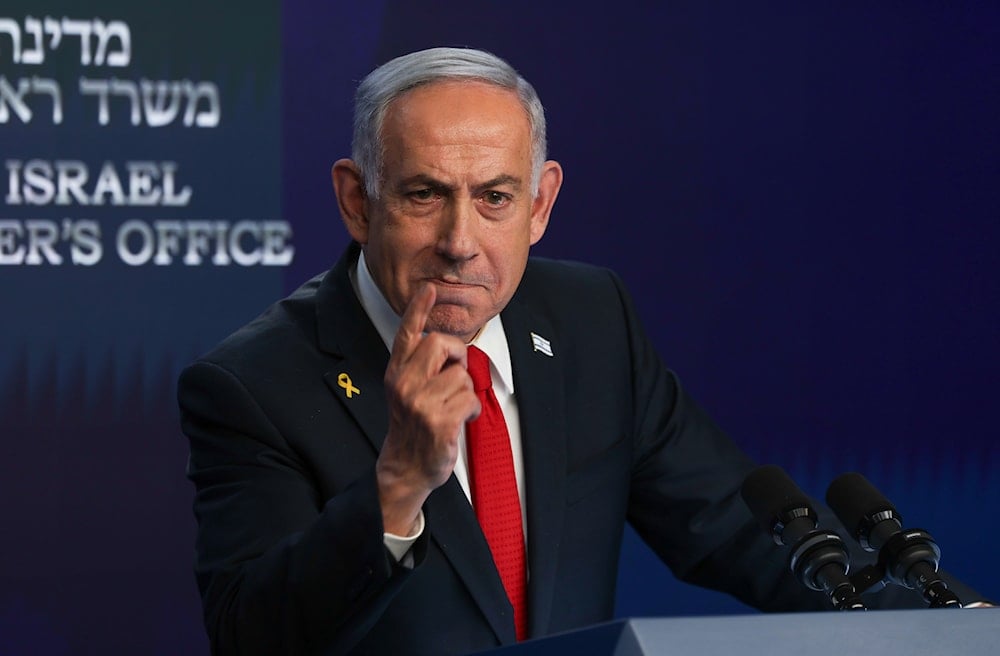Barak dubs Gaza war cover for Netanyahu survival, 'strategic disaster'
Ehud Barak warns that Netanyahu's refusal to end the war on Gaza threatens both captives and the entity's "strategic future".
-

Israeli Prime Minister Benjamin Netanyahu speaks during a press conference in occupied al-Quds, Wednesday, May 21, 2025 (Pool Photo via AP)
Nearly 20 months after October 7, 2023, "Israel’s" Gaza war has reached a critical juncture, argues former Prime Minister Ehud Barak in an opinion piece published by the Financial Times.
In a sharply worded critique, Barak denounces the continuation of the war as a “strategic disaster,” urging Israeli leadership to pursue urgent political clarity and moral responsibility.
Barak lays out two choices: either reach a deal that secures the release of all remaining captives and ends the war, or continue pursuing what he calls the illusion of “total victory” over Hamas through military force. He warns that renewed fighting in Gaza is not only futile but endangers the remaining captives and deepens the humanitarian catastrophe in the Strip.
Barak contends that reaching a captive deal would overwhelmingly serve "Israel’s national interest." It would bring captives home, halt the destruction, ease the humanitarian crisis in Gaza, and unlock prospects for "regional diplomacy". He envisions a future where "Israel" could engage in initiatives such as "normalized relations with Saudi Arabia and participation in the India-Middle East-Europe Economic Corridor."
Netanyahu’s coalition politics undermine 'peace' prospects
However, Prime Minister Benjamin Netanyahu, Barak argues, is constrained by his far-right coalition. Aligning with figures like Itamar Ben-Gvir and Bezalel Smotrich, who advocate for reoccupying and resettling Gaza, makes a political settlement nearly impossible.
Barak warns that Netanyahu fears the political consequences of compromise, including the potential collapse of his government, renewed demands for an inquiry into the October 7 failure, and damage to his ongoing corruption trial.
“More than 70 percent of Israelis hold him responsible for the October failure, and more than half think he acts based on personal — not national — interests,” Barak notes.
International pressure mounts on Israeli leadership
According to Barak, global patience is running thin. US President Donald Trump reportedly warned Netanyahu, “We will abandon you if you do not end this war.” Allies, including France, the UK, and Canada, have demanded a ceasefire and restoration of humanitarian aid. The UK has already paused trade negotiations.
Barak sees this external pressure as an opportunity, not a threat, for "Israel" to change course and secure what he described as long-term regional gains.
Despite the destruction, Barak insists a workable plan for postwar Gaza remains possible.
Barak blames the current crisis on Netanyahu’s political motives and longstanding strategic miscalculations.
He accuses Netanyahu of ignoring a core military tenet shared by thinkers like Clausewitz and Kissinger, which stipulates that war must serve a clear political objective. Instead, Barak argues, Netanyahu has weaponized the war to protect his own position. “The prime minister is not acting in the national interest; he is acting purely for self-preservation. Every other argument is a smokescreen.”
With Gaza infrastructure already degraded and captives still in peril, Barak asserts that the cost of continuing the war is too high. “Renewed fighting will condemn even more hostages to death,” he writes. “That alone should end the discussion.”
From his perspective, "Israel’s" current "strength", militarily and diplomatically, gives it the leverage to pivot toward a deal. That decision, he concludes, is not only strategically sound but morally urgent.
Read more: 'Israel’s' expansionist path threatens itself: The Economist

 3 Min Read
3 Min Read










